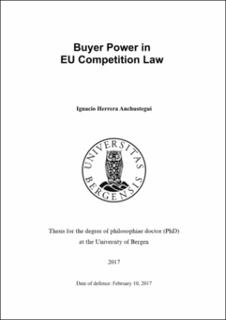| dc.description.abstract | The topic of this dissertation is the analysis of buyer power and its treatment in EU competition law. The aim of the study and its main research question are connected to identifying, synthesizing, discussing, and evaluating the buyer power regulation in EU competition law. To do so, my research seeks to clarify what buyer power is, how it is legally treated, and whether there is a consistent and coherent buyer power competition policy and legal regulation in EU competition law.
Buyer power represents the other side of competition law, focusing on buying conducts and how a buyer can exert its market power to the detriment of competition. Buyer power is an umbrella concept that groups different forms of buying and bargaining over purchasing prices: monopsony and bargaining power (sensu stricto). I define buyer power as the market power possessed by a buyer (or a coordinated group of buyers) that allows said buyer to reduce purchasing prices it pays for an input in a profitable manner below the supplier’s standard selling price. This price reduction can be obtained by either withholding purchases – monopsony – or through bilateral negotiations and pure competitive bargaining that grants the buyer with better contractual conditions. In both cases, the buyer captures a higher share of surplus when negotiating with the supplier that would have been retained by the supplier, absent buyer power. These better terms and conditions can be the result of efficient outcomes, as usually occurs with bargaining power.
As it stems from this definition, the economics effects of buyer power are ambiguous. The welfare results caused by it would depend on the type of buyer power exercised and the competitiveness of the upstream and downstream market. In the upstream market buyer power is exerted vis-à-vis suppliers and its effects may be efficient and competitive enhancing because it neutralizes opposed seller market power and reduces the purchasing prices towards the competitive level that may be passed on to end consumers in the form of lower prices, if there is sufficient competition in the related downstream market. However, buyer power may be anticompetitive and inefficient because it may imply a reduction of purchases and, therefore, an allocative loss, or be used with exclusionary effects of rival buyers in the upstream market or even rival retailers in a connected downstream market. Therefore, my thesis assumes that there tends to be both a positive and negative view concerning buyer power. | en_US |
